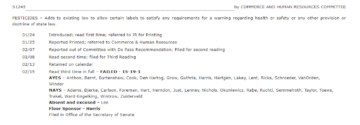
Failed Senate Bill on Pesticide Labeling and Liability to be Heard in House Committee
By Sarah Clendenon • February 28, 2024A bill regarding warning labeling of pesticides in Idaho has been re-introduced in the House of Representatives after a bill with the same language died on the Senate floor on February 15.
Senate Bill 1245 was introduced by Senator Mark Harris (R-Soda Springs). His co-sponsors included:
Senator Hartgen, Senator Burtenshaw, Senator Lakey, Senator Cook, Senator Guthrie, Senator VanOrden, Representative Blanksma, Representative Andrus, Representative Pickett, Representative Garner, Representative Nelsen, Representative Cheatum, Representative Wheeler, Representative Raymond, Representative Clow, and Representative Furniss.
The bill’s statement of purpose explained,
“This legislation amends Idaho Code, Title 22, Chapter 34 and Idaho Code, Title 48, Chapter 6 regarding pesticides and the Idaho Consumer Protection Act. Pesticide labeling is regulated by state and federal laws under the Federal Insecticide, Fungicide and Rodenticide Act (FIFRA). This legislation clarifies that existing regulations of pesticide labels shall be sufficient to satisfy any requirements for a warning regarding health or safety of such products.”
The bill would have added two new sections to Idaho Code.
Testimony included a discussion with James Curry, the Deputy Director of State and Local Government Affairs for Bayer. From the minutes of the Senate Commerce and Human Resources Committee on February 6:
TESTIMONY: Curry testified in support of the bill. He reported on the history of Bayer in Idaho where phosphate had been mined since 1952. He explained phosphate was converted into elemental phosphorus, with the majority of the chemical used for the production of glyphosate and was the active ingredient in Roundup. He reported that for many years, Roundup and its active ingredient, glyphosate, were the subject of litigation and significant media attention. Roundup was a critical tool for farmers and agriculture. He explained the bill said for the purposes of a health and safety warning, the existing regulatory process in place under FIFRA was sufficient to satisfy any requirement for a warning label. He noted farmers needed to be assured of the continued availability of these important tools.
Mr. Curry noted legislative certainty was needed even though states had every right to build on the Federal Government’s baseline regulations, they should not have the ability to directly contradict the scientific findings and ignore the rigorous review processes already in place. The science and the law were clear. When used according to label specifications, glyphosate was safe for use. He stated the legal challenges caused significant legal costs and created many uncertainties. He noted resources dedicated to litigation costs could otherwise be invested in research and development, which would allow Bayer to bring new and more innovative tools to farmers. He stated the industry needed help from the Legislature to ensure its ability to mine, manufacture, and deliver essential tools to farmers in Idaho and around the globe.
AdvertisementDISCUSSION: Senator Lakey and Mr. Curry discussed the Environmental Protection Act’s (EPA) rigorous requirements and the 8-to-12-year process requirement for approval. They talked about how warning labels were reviewed on a regular basis. The EPA reassured consumers Roundup was safe and not a carcinogen because of the ongoing studies.
A group called Think Liberty Idaho tweeted this video compilation of the bill being presented, and some of the testimony and discussion.
Roundup Immunity Bill S1245
Senate Commerce and Human Resources Committee votes 5-3 (1 absent) to move S1245 to the Senate floor with a do-pass recommendation. Worth noting, FOUR of the sitting Senators in this committee are co-sponsors of the bill; Guthrie, Hartgen, Lakey, and… pic.twitter.com/wYdwvqLavZ
— Think Liberty Idaho (@thinklibertyID) February 14, 2024
The bill made it out of committee with a do-pass recommendation and was sent to the Senate floor to be debated. The bill did not pass the full Senate, failing on a vote of 15-19-1.

This week, a draft with the same language was presented by Representative Megan Blanksma (R-Hammett) in the House Ways and Means Committee. The committee voted to print the legislation as House Bill 653. The updated statement of purpose says,
“This legislation amends Idaho Code, Title 22, Chapter 34, and Idaho Code, Title 48, Chapter 6 regarding pesticide labeling and the Idaho Consumer Protection Act. Pesticide labeling is regulated by state and federal laws. This legislation clarifies that existing regulations of pesticide labels shall create a presumption that there was an adequate warning regarding the health and safety from the pesticide label that can be rebutted in a court of law that the warning was inadequate to protect from unreasonable risks of injury or damage, or that the warning was procured by fraudulent conduct.”
The new bill proposes the same changes to Idaho Code – the addition of a new section in Title 22 and the addition of a new section in Title 48.
H653 bill textOpponents of the bill say if passed, this will give agricultural-pharmaceutical companies immunity from legal liability in cases of injury and disease related to pesticide and insecticide products used in agriculture.
Think Liberty Idaho tweeted this image and wrote,
“Bayer has a seat on the IACI board of directors.”
IACI is the Idaho Association of Commerce and Industry. Idaho Dispatch is working to verify whether the statement made by Think Liberty Idaho in regard to Bayer and IACI is accurate.
According to the Idaho Legislature website, the bill has been referred to the House Business Committee, but no hearing date has been publicly scheduled.
Idaho Dispatch asked Representative Blanksma for comment on the legislation. This article will be updated if a response is received.
Feature image courtesy of naturalblaze.com
Tags: 2024 Idaho Legislative Session, Bayer, Cancer, EPA, Glyphosate, House Bill 653, IACI, Idaho Association of Commerce and Industry, Idaho Legislature, Insecticide, James Curry, Legal Liability, Litigation, Mark Harris, Megan Blanksma, Monsanto, Pesticide, Round Up, Senate Bill 1245, Think Liberty Idaho, Warning label
11 thoughts on “Failed Senate Bill on Pesticide Labeling and Liability to be Heard in House Committee”
Comments are closed.

















How about doing a story on the chemicals that they’re spraying on us? I live out in Owyhee County and wake up to tic tac toe in the sky almost daily. I have countless videos and pictures of this activity. Noone else concerned about this? It can be clear as a bell and within hours those lines turn the sky into a haze. WTF? The people want answers.
I have written the governor in Idaho. These chemical trails are horrible. We all know about them. We’re all trying to get someone to do something! We may need to do rallies. New Hampshire has banned them. Texas is doing the same. I lived in Spokane Washington, and had blisters on the top of my head until I moved to Idaho. Now I’m contending with not only chemical trails but a 5G tower within a quarter mile where I live. 5G causes neurological damage and we all know that so why in the hell do they keep the dangers to our health in constant practice? I cannot have Wi-Fi in my apartment because it causes convulsions to me. I use ethernet. When I’m on my cell phone I use data. I have talked to people about the differences in bandwidth and there are differences. We need to get our legislators on this end yesterday! They, too, will be harmed, if not already.
Well gee, if Mike Moyle is for this bill, it certainly must be good for the rest of us “commoners”. “sarcasm intended”
I agree. For those who think chemtrails are a conspiracy theory, I would invite them to look up and ask themselves how many international flights are actually flying overhead at the same time, creating criss-cross patterns, and why clear sunny days are turned into gray, and why this can be seen over every city and farmland in Idaho. They might even look at a flight tracker app which shows all commercial flights, and see if the ones overhead spewing white lines for miles are accounted for. Then we can discuss whether or not this is conspiracy theory or fact.
What is being called “chem-trails” are from high altitude jet engines and water vapor expelled from an internal combustion engine. This does not have anything to do with agriculture sprays on farm drops. If you think that crop duster planes can get high enough to create these trails you are surely misinformed.
Bless your heart.
We are not talking crop dusters! You are sadly misinformed and lack any study from a large variety of resources on this subject. Get educated?
No one is concerned about contrails, the water vapor you refer to. These are harmless and very temporary. Please don’t confuse these with what has come to be called chemtrails. These will last for hours from horizon to horizon and spread out. with the sun at the right angle in relation to the chemtrails, you can see the “oil slick” like rainbow colors that are visibly unnatural. If you want to see the difference, notice if the aircraft makes a trail that soon behind it dissipates again, contrail. Lasting long past when the aircraft has gone, and spreads over the next few hours, chemtrail. Just look up and notice.
I’m glad to see that some agree with me and many others regarding chem trails.it’s been going on for years. Water vapor condenses; it doesn’t spread out over the skies like the chem trails ruining the beautiful blue skies we get here.
Big Money lobbies weak politicians (most of them) in order to coerce a favorable vote. “To hell with The People” is their motto, kinda like IACI’s.
What about Round up ready food crops?